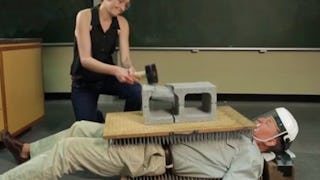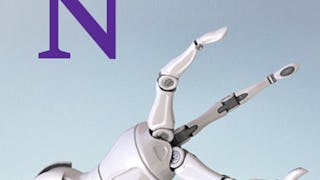- Browse
- Mechanics
Mechanics Courses
Mechanics courses can help you learn the principles of motion, forces, energy, and momentum, along with their applications in practical work. You can build skills in problem-solving, analytical thinking, and mathematical modeling, that support understanding complex systems. Many courses introduce tools such as simulation software and graphing calculators, which aid in visualizing concepts and performing calculations, allowing you to apply mechanics in fields like engineering, robotics, and physics.
Popular Mechanics Courses and Certifications
 Status: PreviewPreviewG
Status: PreviewPreviewGGeorgia Institute of Technology
Skills you'll gain: Engineering Analysis, Mechanics, Torque (Physics), Engineering Calculations, Mechanical Engineering, Engineering, Civil Engineering, Structural Analysis, Applied Mathematics, Trigonometry
4.8·Rating, 4.8 out of 5 stars5.1K reviewsMixed · Course · 1 - 3 Months
 Status: Free TrialFree TrialR
Status: Free TrialFree TrialRRice University
Skills you'll gain: Mechanics, Torque (Physics), Physics, Problem Solving, Mechanical Engineering, Engineering Calculations, Calculus, Engineering Analysis, Graphing, Physical Science, Mathematical Modeling, Algebra, Applied Mathematics, Geometry, Trigonometry
4.7·Rating, 4.7 out of 5 stars296 reviewsIntermediate · Specialization · 1 - 3 Months
 Status: Free TrialFree TrialU
Status: Free TrialFree TrialUUniversity of Colorado Boulder
Skills you'll gain: Quantitative Research, Engineering Calculations, Mechanical Engineering, Numerical Analysis, Chemistry, Physics, Simulation and Simulation Software, Mathematical Modeling, Differential Equations
4.5·Rating, 4.5 out of 5 stars744 reviewsAdvanced · Course · 1 - 4 Weeks
 Status: PreviewPreviewU
Status: PreviewPreviewUUNSW Sydney (The University of New South Wales)
Skills you'll gain: Mechanics, Physics, Experimentation, Engineering Calculations, Applied Mathematics, Physical Science, Systems Of Measurement, Engineering Analysis, Mathematical Modeling, Estimation
4.7·Rating, 4.7 out of 5 stars1.1K reviewsBeginner · Course · 1 - 3 Months
 Status: Free TrialFree TrialN
Status: Free TrialFree TrialNNorthwestern University
Skills you'll gain: Robotics, Machine Controls, Control Systems, Automation Engineering, Mathematical Modeling, Mathematical Software, Simulation and Simulation Software, Engineering Calculations, Engineering, Mechanics, Mechanical Engineering, Artificial Intelligence, Vibrations, Applied Mathematics, Engineering Analysis, Automation, Virtual Environment, Torque (Physics), Graph Theory, Matlab
4.7·Rating, 4.7 out of 5 stars1.2K reviewsIntermediate · Specialization · 3 - 6 Months
 Status: Free TrialFree TrialI
Status: Free TrialFree TrialIISAE-SUPAERO
Skills you'll gain: Mechanics, Thermal Management, Energy and Utilities, Hazard Analysis, Risk Control, Physical Science, Simulations, Applied Mathematics, Control Systems, Systems Of Measurement, Vibrations, Engineering Analysis, Engineering Calculations, Physics, Engineering, Mathematical Modeling
4.7·Rating, 4.7 out of 5 stars585 reviewsBeginner · Specialization · 3 - 6 Months
What brings you to Coursera today?
 Status: PreviewPreviewG
Status: PreviewPreviewGGeorgia Institute of Technology
Skills you'll gain: Structural Analysis, Mechanical Engineering, Failure Analysis, Engineering Analysis, Mechanics, Materials science, Engineering Calculations, Civil Engineering, Mathematical Modeling, Trigonometry
4.8·Rating, 4.8 out of 5 stars3.5K reviewsMixed · Course · 1 - 3 Months
 Status: Free TrialFree TrialU
Status: Free TrialFree TrialUUniversity of Colorado Boulder
Skills you'll gain: Electrical Engineering, Numerical Analysis, Linear Algebra, Physics, Angular, Applied Mathematics, Advanced Mathematics, Mathematical Modeling, Engineering Analysis, Calculus, Differential Equations, Simulations, Physical Science
Build toward a degree
4.4·Rating, 4.4 out of 5 stars105 reviewsIntermediate · Specialization · 1 - 3 Months

Skills you'll gain: Simulation and Simulation Software, Engineering Analysis, Simulations, Engineering, Prototyping, Computer-Aided Design, Engineering Design Process, Cloud Computing
4.5·Rating, 4.5 out of 5 stars382 reviewsBeginner · Guided Project · Less Than 2 Hours
 Status: FreeFreeÉ
Status: FreeFreeÉÉcole normale supérieure
Skills you'll gain: Sampling (Statistics), Physics, Simulations, Computational Logic, Numerical Analysis, Markov Model, Quantitative Research, Algorithms, Applied Mathematics, Linear Algebra, Integral Calculus
4.8·Rating, 4.8 out of 5 stars268 reviewsMixed · Course · 1 - 3 Months
 Status: Free TrialFree TrialD
Status: Free TrialFree TrialDDartmouth College
Skills you'll gain: Structural Analysis, Structural Engineering, Architectural Engineering, Building Design, Vibrations, Civil Engineering, Engineering, Construction, SketchUp (3D Modeling Software), Mechanics, Engineering Analysis, Engineering Calculations, Mathematical Modeling, Engineering Design Process, Design, Simulation and Simulation Software, Experimentation, Materials science, 3D Modeling
4.8·Rating, 4.8 out of 5 stars174 reviewsBeginner · Specialization · 3 - 6 Months
 Status: Free TrialFree TrialR
Status: Free TrialFree TrialRRice University
Skills you'll gain: Mechanics, Problem Solving, Physics, Graphing, Mathematical Modeling, Algebra, Calculus, Physical Science, Applied Mathematics, Mechanical Engineering, Geometry, Trigonometry
4.7·Rating, 4.7 out of 5 stars197 reviewsIntermediate · Course · 1 - 4 Weeks
Searches related to mechanics
In summary, here are 10 of our most popular mechanics courses
- Introduction to Engineering Mechanics: Georgia Institute of Technology
- Introduction to Mechanics: Rice University
- Quantum Mechanics: University of Colorado Boulder
- Mechanics: Motion, Forces, Energy and Gravity, from Particles to Planets: UNSW Sydney (The University of New South Wales)
- Modern Robotics: Mechanics, Planning, and Control: Northwestern University
- Fundamentals of Flight mechanics: ISAE-SUPAERO
- Mechanics of Materials I: Fundamentals of Stress & Strain and Axial Loading: Georgia Institute of Technology
- Quantum Mechanics for Engineers: University of Colorado Boulder
- Computational Fluid Mechanics - Airflow Around a Spoiler: Coursera
- Statistical Mechanics: Algorithms and Computations: École normale supérieure
Frequently Asked Questions about Mechanics
Mechanics is the branch of physics that deals with the motion of objects and the forces that affect them. It is crucial because it provides the foundational principles that govern how things move and interact in our physical world. Understanding mechanics is essential for various fields, including engineering, physics, and even everyday problem-solving. By grasping these concepts, individuals can apply them to real-world situations, making mechanics a vital area of study for anyone interested in technology, design, or the natural sciences.
A background in mechanics opens up a variety of career opportunities. Jobs in this field can range from mechanical engineers and aerospace engineers to roles in automotive design and robotics. Positions may include working as a design engineer, systems engineer, or even a research scientist. Each of these roles requires a solid understanding of mechanical principles, making it essential for those looking to enter these industries to have a strong foundation in mechanics.
To succeed in mechanics, you should focus on developing a range of skills. Key skills include problem-solving, analytical thinking, and proficiency in mathematics, particularly calculus and algebra. Familiarity with computer-aided design (CAD) software and an understanding of physics principles are also important. Additionally, hands-on experience through projects or internships can significantly enhance your practical skills and understanding of mechanical systems.
There are several excellent online courses available for those interested in mechanics. For a comprehensive introduction, consider the Introduction to Mechanics Specialization. If you're interested in aerospace applications, the Fundamentals of Flight Mechanics Specialization offers in-depth knowledge. For those looking at robotics, the Modern Robotics: Mechanics, Planning, and Control Specialization is a great choice.
Yes. You can start learning mechanics on Coursera for free in two ways:
- Preview the first module of many mechanics courses at no cost. This includes video lessons, readings, graded assignments, and Coursera Coach (where available).
- Start a 7-day free trial for Specializations or Coursera Plus. This gives you full access to all course content across eligible programs within the timeframe of your trial.
If you want to keep learning, earn a certificate in mechanics, or unlock full course access after the preview or trial, you can upgrade or apply for financial aid.
Learning mechanics can be approached through various methods. Start by enrolling in online courses that cover the basics and gradually progress to more advanced topics. Engage with practical projects or simulations to apply what you've learned. Additionally, reading textbooks and research papers can deepen your understanding. Joining online forums or study groups can also provide support and enhance your learning experience.
Typical topics covered in mechanics courses include kinematics, dynamics, statics, and fluid mechanics. You may also explore topics like energy, momentum, and the principles of forces and motion. Advanced courses might explore into specialized areas such as quantum mechanics or flight mechanics, providing a broader understanding of how mechanics applies in various contexts.
For training and upskilling employees in mechanics, courses like the Analytical Mechanics for Spacecraft Dynamics and Engineering Mechanics: Statics are highly recommended. These courses provide practical applications and theoretical knowledge that can enhance workforce capabilities in engineering and technology sectors.










